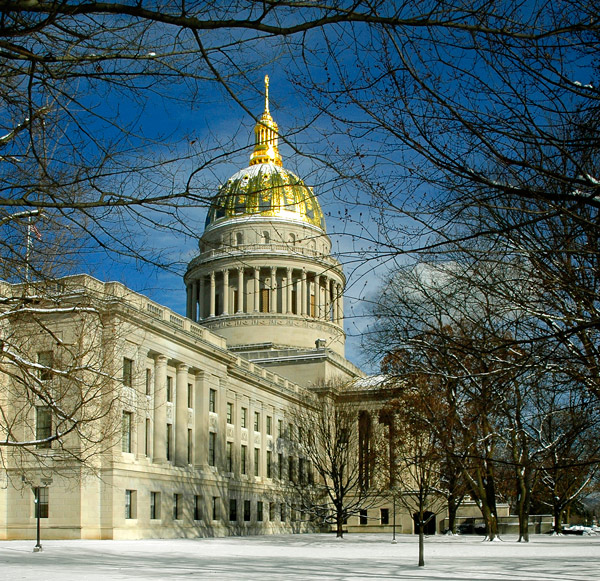- Like
- Digg
- Del
- Tumblr
- VKontakte
- Buffer
- Love This
- Odnoklassniki
- Meneame
- Blogger
- Amazon
- Yahoo Mail
- Gmail
- AOL
- Newsvine
- HackerNews
- Evernote
- MySpace
- Mail.ru
- Viadeo
- Line
- Comments
- Yummly
- SMS
- Viber
- Telegram
- Subscribe
- Skype
- Facebook Messenger
- Kakao
- LiveJournal
- Yammer
- Edgar
- Fintel
- Mix
- Instapaper
- Copy Link
In our end-of-year newsletter we provided an overview of some of the issues we expect to take up time and attention under the dome during the 2022 legislative session. Here’s a glimpse of what transpired over the first few days, opportunities to learn, and information about how to engage your legislators and make your voice heard.
Courts/Access to Justice – Big changes are coming to West Virginia’s judicial system, after the passage in 2021 of SB 275, which established a new intermediate court of appeals that will review most trial court decisions before they reach the state Supreme Court. SB 275 also made other significant changes to the process of appealing objections to workers compensation claims that attorneys for injured workers say will politicize the process and deny or delay justice for their clients. These changes have been long sought by corporate interests, but their efforts to undermine access to justice for regular West Virginians have no bounds. Among the items still on their wish list is restricting access to medical monitoring when someone is exposed to a dangerous toxin or defective product. While it may take years for some diseases caused by that exposure, such as cancer, to develop, those who are exposed to the dangerous toxins need to have regular medical monitoring so that treatment can start as soon as any illnesses are found. Refusing to allow medical testing until disease occurs could be a death sentence. Early detection allows for early treatment which saves time, money and lives, but greedy corporations, the same ones pushing for the changes to our water quality standards described below, want to prohibit medical monitoring claims until someone gets sick, defeating the very rationale for these claims.
Current Status: Last year a bill restricting access to medical monitoring passed the Senate, but was rejected by the House. At least three bills related to medical monitoring have been introduced in the Senate this year (SB 7, SB 211 and SB 225). Meanwhile, Governor Justice made his appointments to the three-person appellate court, which bring with them considerable ethical issues and potential conflicts of interest. These include the issue of one of the appointees, Dan Greear, being the founder of the anti-LGBTQ hate group known as the Family Policy Council. Greear currently serves as general counsel to the House of Delegates and worked as chief of staff for former House speaker and current state Supreme Court Justice Tim Armstead. He also received major backing from the Republican State Legislative Committee (RSLC) when he ran for circuit court in 2018. The RSLC’s top donors include the U.S. Chamber of Commerce, the main proponent for creating the ICA.
Health Care – Building on past successes capping insulin copays and adding adult dental coverage to Medicaid, the WV Health Care for All coalition has a new agenda that they will be working to pass in the upcoming session to ensure that all West Virginians have access to quality, comprehensive affordable health care.
Current Status: On Thursday, the coalition will host an advocacy training that will cover the basics on how to contact and build relationships with your representatives, and what you can do you support support the 2022 agenda. Register here.
Racial Justice and Non-Discrimination – Although bills to prohibit hair discrimination and to protect members of the LQBTQ community from dicrimination in employment and housing stalled in previous sessions, advocates for the CROWN (Create a Respectful and Open World for Natural Hair) Act and the Fairness Act aren’t giving up the fight. They’ve also been making significant headway at the local level. In the months since the 2021 legislative session ended, at least four cities (Charleston, Morgantown, Beckley and Lewisburg) across the state have adopted CROWN Act ordinances which ban discrimination against based on hairstyles associated with race, such as natural Black hair or dredlocks. In July, South Charleston became the 15th city in West Virginia to ban LGBTQ discrimination. This year, Charleston and Morgantown also passed bans on conversion therapy, a pseudoscientific practice where a medical provider attempts to change someone’s sexual orientation or gender identity.
Current Status: Events are planned to support both the Fairness Act (sign up here to be a part of the Fight for Freedom Action Day, a virtual day of activities to stand up for reproductive rights and LBGTQ equality) and the CROWN Act (a rally is being planned for January 28 at 1 PM at the State Capitol. Details will be forthcoming.). However, there are a number of bills that amount to attacks on marginalized communities that must be vigorously opposed. These include:
- Prohibiting certain “divisive concepts” from schools, state agencies and any groups receiving state funding (HB 2595), which would prohibit important, necessary discussions about systemic racism, oppression and privilege from taking place in schools and the workplace;
- The Religious Freedom Restoration Act (HB 2545), which would allow anyone to discriminate against LGBTQ people in the name of religion; and
- The WV Monument and Memorial Protection Act (HB 2174), which would prohibit local governments from removing Confederate and other monuments without state approval.
Reproductive Justice/Bodily Autonomy – On December 1, the nation watched as the US Supreme Court heard oral arguments in a case that directly challenges Roe v. Wade, the precedent setting case that has protected reproductive freedom for millions of Americans for nearly 50 years. If the Court overturns Roe, half the states in the U.S. are poised to ban abortion entirely including West Virginia.
Current Status: Ultra-conservative legislators are chomping at the bit to impose further restrictions on abortion access in West Virginia, and they aren’t waiting for the Supreme Court to rule. On the second day of the session members of the House of Delegates started moving a bill that would ban abortions at 15 weeks, just like a Mississippi law under review by the Court. The bill (HB 4004), would prohibit abortions after 15 weeks of gestation, well below viability and the line set forth by Roe v. Wade. HB 4004 and HB 4005, which imposes invasive, cruel, unnecessary requirements regarding disposal of fetal tissue, have both passed through the House Health committee and are on their way to Judiciary.
This is a red alert moment for reproductive freedom. Legislators need to hear from you. The right to decide if or when to have a child is essential to a person’s ability to make highly personal decisions about their body and their future. We can’t stand by while politicians try to restrict people’s personal freedoms and take away their health care.
Tax and Budget – During the 2021 session, WV CAG was part of a coalition of groups that helped defeat a bill to eliminate West Virginia’s personal income tax. The proposal would have overwhelmingly benefited the wealthy by replacing the income tax with higher sales taxes that would be a net tax increase for low and middle income families, while also blowing a huge hole in the budget that would have resulted in huge cuts to critical programs and services. Although, people power played a major role in defeating the income tax repeal, disagreement between the House and the Senate was also factored in, so look for it’s return in 2022.
Current Status: In the meantime, the Governor has proposed a flat budget, but one that includes raises and bonuses for state workers, teachers and school service personnel. We rely on our friends at the WV Center on Budget and Policy for their in-depth analysis of the budget. If you would like to support their work and hear their analysis first hand there’s still time to register for their annual Budget Breakfast. Hurry! Event registration closes tomorrow, Tuesday, Jan. 18 at 12pm. The presentations will also be streamed via their Facebook page to accommodate those who do not wish to attend an in-person event.
Voting Rights & Democracy – You may recall that one of last year’s victories was the defeat of a bill (SB 565) that would have eliminated the most popular days of early voting, gutted automatic voter registration and start the process of removing voters from rolls after two years (instead of four) if someone hasn’t voted. With voting rights under attack around the county — this year, 19 states have enacted 33 laws that will make it harder for Americans to vote — we fully expected to see this proposal again in 2022, if not sooner. It’s important we remain vigilant and prepared to and ready to mobilize against measures to restrict access to voting in West Virginia.
Current Status: The ongoing threats to our freedom to vote make it critical that Congress set national standards to ensure that all Americans have equal access to the ballot ahead of the 2022 elections. Passing the Freedom to Vote Act and the John Lewis Voting Rights Advancement Act are our best opportunity to respond to these threats to our democracy, further voter protections, strengthen election integrity, reign in dark money, and end partisan and racial gerrymandering.
On this Martin Luther King, Jr. Day, Dr. King’s family has called for us to focus on demanding voting rights legislation and access to the ballot box. We must raise our collective voices and call on our elected leaders to cement his legacy by passing legislation to secure the freedom to vote for all Americans.
Failure to deliver voting rights legislation will put senators on the wrong side of history. Now is the time to make your voice heard.
Call Senators Manchin and Capito and demand passage of these vital pieces of legislation without letting outdated Senate rules get in the way.
Senator Manchin – 202-224-3954 (Washington) or 304-342-5855 (Charleston)
Senator Capito – 202-224-6472 (Washington) or 304-347-5372 (Charleston)
Water Quality Standards – One of the anticipated policies that will be up for debate is a WV Department of Environmental Protection rule making revisions to the state’s water quality standards. The proposed changes are part of a second round of revisions to the human health criteria, the portion of our water quality standards that protect our health from dangerous pollutants like cancer causing toxins, chemicals known to cause birth-defects, and poisons like cyanide. As proposed, the rule would allow more toxins in our drinking water sources, but also creates a loophole for polluters to discharge even more toxins in our water with less public involvement.
Current Status: In December, the rule was considered by the WV Legislative Rule-Making Review Committee. This special joint committee reviews agency rules before the start of the regular session. Amendments to the rule were offered by Delegate Barbara Fleischauer (D-Monongalia) and Senator Rich Lindsay (D-Kanawha). Their amendments were aimed at keeping toxin limits at current levels, unless their allowable limits were reduced; and closing a loophole that would bypass legislative review for future limit modifications. Both amendments failed.
There will be more opportunities to amend the rule before it completes the legislative process. To keep up with the latest, sign up for water policy updates from our friends at the WV Rivers Coalition.



